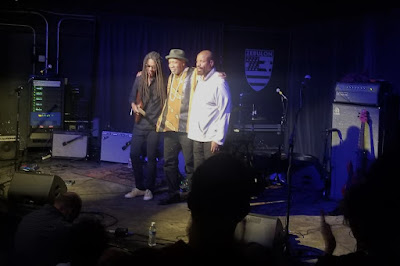Samsara (the cycle of death and rebirth in our material world in Indian philosophy) is a welcome return to recording by PainKiller, the trio formed in 1991 comprising saxophonist John Zorn, bassist Bill Laswell, and Mick Harris, whose lightning fast drumming is replaced by beats and electronics, and which quickly recorded two albums in 1991-1992, followed by a 1993 live album and 1994's Execution Ground, which reflected a gradual move into more ambient and dub territory. A second live recording, made in 1994, was issued eight years later, followed by a couple more live recordings with other drummers.
In 2008, Harris joined Zorn and Laswell for a one-off performance in Paris, accompanied by vocalist Mike Patton and Fred Frith, whose Guitar Solos was the last post here. It seemed like that was going to be the last time we'd hear from PainKiller, until the surprising news that Samsara was to be released last November.
The most striking difference from earlier recordings is Harris' use of electronic percussion, which he has focused on in myriad ways for the last three decades, and, to this listener, it takes the PainKiller sound in an interesting and welcome direction. Zorn, who played to Harris' recorded material sent to New York City from Birmingham, England, shows all of the incredible technique and power he's had for a half-century, and, as always, is very impressive.
Laswell has had serious health and financial issues and Zorn has worked frequently with his old friend in recent years to help him deal with both and, if for no other reason, this is a fundamental reason for PainKiller to reunite. Laswell has great difficulty in playing the bass and so relied on some technical assistance while resorting to playing that is far more basic and simple, but still very effective in holding the bottom along with Harris' contributions so that Zorn can explore the dynamic range of his sax.
A new album, The Equinox, is due to be released this month and, apparently, an ambient recording is also in the works sometime this year, so there will likely be more PainKiller posts in the offing relatively soon.



